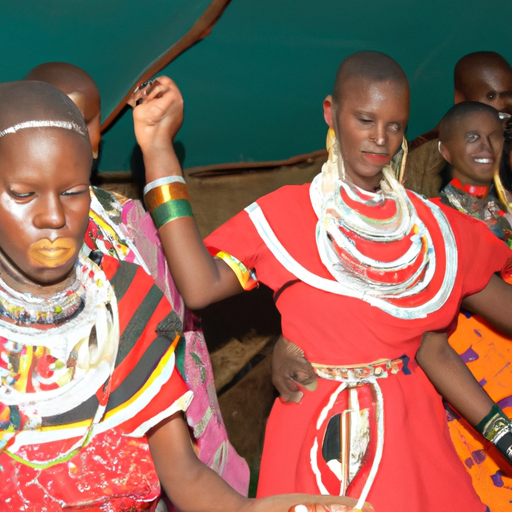What Is The Role Of NGOs In Kenya?
In Kenya, NGOs play a vital role in addressing social, economic, and environmental challenges faced by the country. These non-governmental organizations work tirelessly to promote sustainable development, advocate for human rights, and provide essential services to marginalized communities. By collaborating with local communities, government agencies, and international partners, NGOs in Kenya strive to create lasting impact and drive positive change. Let’s explore the various ways in which NGOs are shaping the future of Kenya and empowering its citizens.
Advocacy and Policy Influence
Addressing socio-political issues
NGOs in Kenya play a crucial role in addressing socio-political issues that affect the country’s development and well-being. They advocate for the rights of marginalized communities, promote social justice, and work towards creating a more inclusive society. Through research, lobbying, and public campaigns, NGOs raise awareness about these issues and push for policy changes to address them effectively.
Engaging with national and local governments
NGOs actively engage with both national and local governments to influence policy decisions and ensure that the needs and priorities of the communities they serve are adequately addressed. They participate in policy dialogues, consultations, and task forces to provide expert inputs and advocate for the adoption of policies that promote social development, sustainable resource management, and equitable access to essential services.
Influencing policy development and implementation
NGOs in Kenya play a significant role in influencing policy development and implementation at various levels. They monitor policy implementation and hold decision-makers accountable for their actions. By conducting rigorous research, collecting data, and providing evidence-based analysis, NGOs shape policy agendas and advocate for frameworks that address the root causes of social and economic challenges in the country.
Humanitarian Assistance and Emergency Response
Providing immediate relief during crises
NGOs in Kenya play a crucial role in providing immediate relief during crises, such as natural disasters or conflicts. They respond promptly by delivering emergency food, shelter, clean water, medical assistance, and other essential supplies to affected populations. NGOs work tirelessly on the ground, collaborating with local communities, governments, and other stakeholders to ensure that urgent needs are met and affected communities can begin to recover and rebuild their lives.
Assisting vulnerable populations
NGOs focus their efforts on assisting vulnerable populations, including refugees, internally displaced persons, and marginalized communities. They provide critical support in areas such as healthcare, education, livelihoods, and protection. By working directly with these populations, NGOs ensure that their voices are heard, their rights are protected, and their needs are met in a dignified and sustainable manner.
Coordinating emergency response activities
NGOs in Kenya often play a coordinating role in emergency response activities. They collaborate with other humanitarian actors, both local and international, to ensure a coordinated and efficient response. By working together, NGOs can pool resources, share information, and avoid duplicating efforts. This coordination helps to optimize the impact of humanitarian assistance and ensure that aid reaches those who need it the most.
Education and Capacity Building
Promoting access to quality education
NGOs recognize the importance of education as a fundamental right and a key driver of development. They work towards promoting access to quality education for all, especially those who are marginalized or living in remote areas. NGOs support initiatives that increase enrollment, improve the quality of teaching, and enhance learning outcomes. They also advocate for policies that prioritize education funding and guarantee equal opportunities for all children in Kenya.
Developing educational infrastructure
NGOs play a crucial role in developing educational infrastructure in Kenya. They collaborate with local communities, governments, and other stakeholders to build schools, classrooms, libraries, and other educational facilities. By investing in infrastructure, NGOs create an enabling environment for learning and ensure that children have access to safe and conducive educational spaces.
Facilitating teacher training programs
NGOs recognize the importance of skilled teachers in delivering quality education. They facilitate teacher training programs and professional development opportunities to enhance teaching skills and pedagogical approaches. By investing in the capacity building of teachers, NGOs contribute to improving the quality of education and ensure that learners receive the best possible support for their learning journey.
Healthcare and Public Health Initiatives
Improving healthcare access and services
NGOs play a crucial role in improving healthcare access and services in Kenya. They work towards strengthening healthcare systems, ensuring the availability of essential medicines and medical supplies, and promoting equitable access to healthcare facilities. NGOs also collaborate with local communities to raise awareness about preventive healthcare measures, promote healthy behaviors, and reduce the burden of diseases in the country.
Implementing disease prevention programs
NGOs actively engage in disease prevention programs, including vaccination campaigns, HIV/AIDS prevention initiatives, and efforts to combat malaria and other infectious diseases. They work closely with local communities, healthcare providers, and government agencies to implement evidence-based interventions that reduce the spread of diseases and improve overall public health outcomes.
Advocating for public health policies
NGOs advocate for public health policies that promote the well-being of communities in Kenya. They push for the implementation of policies that prioritize preventive healthcare, ensure affordable access to essential medicines, and address the social determinants of health. By advocating for public health policies, NGOs create an enabling environment for improved healthcare outcomes and contribute to the overall well-being of the population.
Environmental Conservation and Climate Change
Preserving natural resources and ecosystems
NGOs in Kenya actively work towards preserving natural resources and ecosystems. They engage in activities such as reforestation, habitat restoration, and biodiversity conservation to protect the environment and ensure its sustainability for future generations. NGOs also collaborate with local communities to promote sustainable land and water management practices, reduce deforestation, and conserve fragile ecosystems.
Promoting sustainable land and forest management
NGOs recognize the importance of sustainable land and forest management in mitigating climate change and ensuring food security. They work with local communities and governments to promote sustainable agricultural practices, agroforestry, and watershed management. By advocating for sustainable land and forest management, NGOs contribute to mitigating climate change, preserving biodiversity, and improving the resilience of ecosystems and communities.
Raising awareness about climate change
NGOs play a crucial role in raising awareness about climate change and its impacts on communities and ecosystems. They organize awareness campaigns, conduct training sessions, and develop educational materials to inform the public about the causes and consequences of climate change. NGOs also advocate for policies that support renewable energy, promote energy efficiency, and reduce greenhouse gas emissions to combat climate change effectively.
Gender Equality and Women Empowerment
Advocating for women’s rights and gender equality
NGOs in Kenya actively advocate for women’s rights and gender equality. They work towards eliminating gender-based discrimination, promoting equal opportunities for women and girls, and challenging harmful gender norms and stereotypes. NGOs engage in policy advocacy, public campaigns, and awareness-raising activities to ensure that gender equality is prioritized in national development agendas and that women’s voices are heard and valued.
Fighting against gender-based violence
NGOs in Kenya are at the forefront of the fight against gender-based violence. They provide comprehensive support services to survivors of violence, including counseling, legal aid, and shelters. NGOs also engage in community sensitization activities to change attitudes towards gender-based violence, promote gender equality, and encourage social norms that reject violence against women and girls.
Promoting economic empowerment for women
NGOs recognize the importance of economic empowerment in promoting gender equality and women’s rights. They support initiatives that provide training, access to finance, and business development opportunities for women. By promoting economic empowerment, NGOs contribute to reducing poverty, increasing women’s financial independence, and creating a more inclusive and equitable society.
Human Rights and Social Justice
Promoting and defending human rights
NGOs in Kenya are dedicated to promoting and defending human rights for all. They advocate for the respect and protection of civil, political, economic, social, and cultural rights. NGOs monitor human rights violations, document evidence, and engage in strategic litigation to hold perpetrators accountable. They also work towards creating an enabling environment for the enjoyment of human rights by supporting legal reforms, raising awareness, and empowering marginalized communities.
Supporting marginalized communities
NGOs focus their efforts on supporting marginalized communities, including ethnic minorities, indigenous groups, persons with disabilities, and LGBTQ+ individuals. They provide assistance in areas such as legal aid, access to justice, and social services. NGOs also work towards eliminating discrimination, promoting social inclusion, and ensuring equal rights and opportunities for all members of society.
Fostering social inclusion and equality
NGOs in Kenya play a crucial role in fostering social inclusion and equality. They work towards breaking down barriers that prevent marginalized groups from fully participating in social, economic, and political life. NGOs advocate for policies that promote inclusive development, combat discrimination, and ensure equal access to opportunities and services for all members of society. Through their programs and initiatives, NGOs contribute to building a more just and equal society for everyone.
Community Development and Poverty Alleviation
Supporting sustainable livelihoods
NGOs in Kenya support sustainable livelihoods by empowering individuals and communities to generate income and improve their living conditions. They provide training, access to resources, and linkages to markets to enhance livelihood opportunities. NGOs also invest in skills development, entrepreneurship, and agricultural practices to promote sustainable economic growth and poverty reduction.
Implementing poverty reduction programs
NGOs actively implement poverty reduction programs to address the root causes of poverty in Kenya. They focus on providing targeted support to vulnerable communities, including access to education, healthcare, livelihood opportunities, and social protection. NGOs work in collaboration with local communities, government agencies, and other stakeholders to implement evidence-based interventions that lift individuals and communities out of poverty and promote sustainable development.
Strengthening community organizations
NGOs recognize the importance of strong and resilient community organizations in driving sustainable development. They support the capacity building of community-based organizations, cooperatives, and self-help groups to enable them to effectively address local challenges, mobilize resources, and implement community-led initiatives. By strengthening community organizations, NGOs empower communities to take ownership of their development and foster a sense of collective responsibility and resilience.
Peacebuilding and Conflict Resolution
Mediating and resolving disputes
NGOs in Kenya actively engage in peacebuilding and conflict resolution efforts. They mediate and facilitate dialogue among conflicting parties to resolve disputes peacefully. NGOs work towards building trust, fostering understanding, and finding common ground for peaceful coexistence. By promoting dialogue and reconciliation, NGOs contribute to the prevention and resolution of conflicts in Kenya.
Promoting peaceful coexistence
NGOs advocate for peaceful coexistence by promoting tolerance, respect for diversity, and the values of non-violence. They organize peace education programs, inter-community dialogues, and cultural exchange initiatives to foster a culture of peace at the grassroots level. Through their initiatives, NGOs promote social cohesion and create spaces for communities to come together, celebrate their diversity, and build bridges of understanding.
Supporting post-conflict reconciliation
NGOs play a crucial role in supporting post-conflict reconciliation efforts. They provide psychosocial support, transitional justice mechanisms, and peacebuilding activities to heal wounds, reintegrate former combatants, and rebuild trust in divided communities. Through their interventions, NGOs contribute to the long-term stability, recovery, and sustainable peace in post-conflict contexts.
Transparency and Good Governance
Promoting accountability and anti-corruption measures
NGOs in Kenya play a vital role in promoting accountability and advocating for anti-corruption measures. They monitor public institutions, conduct integrity assessments, and expose corruption cases. NGOs also engage in advocacy campaigns to strengthen anti-corruption legislation, promote transparency, and support anti-graft institutions. By promoting accountability and fighting corruption, NGOs contribute to good governance and sustainable development.
Monitoring public expenditure and service delivery
NGOs actively monitor public expenditure and service delivery to ensure transparency and accountability. They assess the efficiency and effectiveness of government programs, advocate for the proper use of resources, and raise awareness about public rights and entitlements. Through their monitoring efforts, NGOs ensure that public funds are utilized for the benefit of all and that essential services reach the intended beneficiaries.
Advocating for transparent governance systems
NGOs advocate for transparent governance systems that promote citizen participation, accountability, and the rule of law. They work towards reforms that strengthen democratic institutions, enhance access to information, and promote civic engagement. By advocating for transparent governance systems, NGOs contribute to building a more inclusive, participatory, and accountable democracy in Kenya.
In conclusion, NGOs in Kenya play a multi-faceted and essential role in addressing various socio-political issues, providing humanitarian assistance, promoting education and capacity building, improving healthcare access, conserving the environment, advocating for gender equality, defending human rights and social justice, fostering community development and poverty alleviation, promoting peacebuilding and conflict resolution, and advocating for transparency and good governance. Through their diverse initiatives and collaborations with stakeholders, NGOs contribute to the overall development, well-being, and empowerment of individuals and communities in Kenya.






